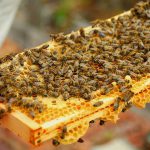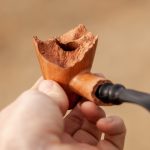
Entrepreneur Basil Williams, the managing director of Herbal View Hydroponics, grows various herbs and plants on his hectare of land among the beautiful farms of Stellenbosch.
With a horticulture degree, Basil’s love for the natural environment and contributing to its preservation, inspired him to further his knowledge by enrolling in an agriculture school and ultimately to start his own herb business.
First steps
Farming runs through Basil’s veins and from an early age he was keen on gardening and reminisces about the time he used to harvest with his uncle.
“I used to grow strawberries with my uncle in my teenage years, which is the first memorable experience I have with farming,” says Basil
Basil joined the Agricultural Research Centre (ARC) nursery in Elsenburg Stellenbosch, where he worked with fynbos, the hard-leaved Mediterranean type of plants. Basil began experimenting with herbs in his mother’s backyard at Kylemore in Stellenbosch.
“I started in my mother’s backyard with a greenhouse shade-net and took all the experience I gained from the ARC to start my own herb business and that his how Herbalview Hydroponics came to life,” says Basil.
Inputs
Basil grows coriander corns, thyme, origanum and rosemary, and smaller-scale herbs. He grows all his herbs in cocopeat; a type of soil. Cocopeat can produce harvests for up to five-years in hydroponics. “After five-years, I usually blend it with fertiliser, and use it in plant bags for herbs and sell it to the community,” says Basil.
He uses natural certified pesticides from Agro-Organics and can simultaneously spray and harvest at the same time. He also uses organic insect spray with ingredients such as dishwashing liquid and chilli, which kills and spurns pests. Basil does not have major pests and disease issues, but whitefly is sometimes a challenge due to moisture in the tunnels. He uses the spray extract to control the pest and prevent it from attacking his plants.
Producing herbs sustainably
Basil’s older sister and business partner, Caroline Williams, runs production and is responsible for the dissemination of the herbs, while Basil looks for opportunities to grow their business.
Basil purchases his seed from trusted seed companies: “I guarantee that my plantlets are of the best quality”.
“I am quite a big fan off the local organic food movement because it is part of my business plan to grow all our herbs and fine vegetables naturally and organically,” says Basil.
Making a choice on which products to grow was not a hard choice for him.
“I think that my business of producing herbs will be more sustainable. I read-up on its life-span and I’m confident that my business will run for a long period,” says Basil.
Help for entrepreneurs
On his third attempt at applying for the SAB Foundation Tholoana programme and finally getting in, Basil says he has learnt a lot and is excited for what’s to come.
“I have been with many programmes in the past like your SEDA and department of agriculture etc. but I can vouch that the Tholoana Programme has been the best one yet. I even advise people to apply and join because it has helped my business tremendously,” says Basil.
The Tholoana programme is an initiative that invests in entrepreneurs who show passion and commitment to growing the South African economy. The business support programme offers mentorship, business development workshops, and powerful peer networks. The programme also provides opportunities for women, persons with disabilities and the youth.
Role in the community
Basil has played a huge part in growing his community and advocating for the employment of women.
“My role in the community has always been my first point of inspiration when starting my business. I am employing women in my community to develop their skills and in the future to help them grow their own food gardens,” says Basil.
Basil is currently giving food-health talks and educating locals in food gardens in his community, and supplying them with spinach and seedling herbs to help them start their own businesses.
To top that, Basil is an advocate for keeping the environment clean through recycling.
“We currently recycle our waste material into our own compost and re-use it as a potting medium for our herbs and vegetable plants,” says Basil.
The importance of a business plan and marketing strategy
Basil seeks to expand his business through a marketing strategy for value-added products such as pestos and chillies. He plans to achieve this through a well-structured business and marketing plan that is informed by a market analysis and competitor evaluation.
“I have been helping a lot of farmers with mentorship through the Department of Agriculture and have seen entrepreneurs without a vision or business plan fail dismally,” says Basil.
“I would advise new herb-farmers to research the market wisely on which herbs are in demand. Don’t just buy and plant any sort of herbs, choose those that will make your business boom with sales,” says Basil. “I have shared advice on the many aspects for success in farming, including; management, marketing and people management skills, which are important in running any business”.
The way forward
The enthusiastic Basil says he has a clear view of his business going forward and is excited for the future.
“My ultimate goal is to add value and bring change to the food industry, new farmers and empower women in farming.”
Relevant pages on the Agribook website:







